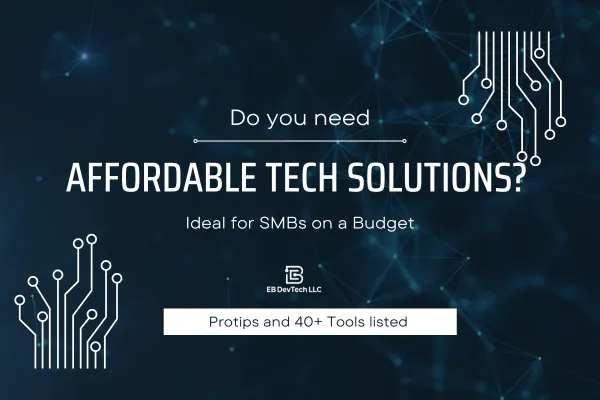
Affordable Tech Solutions for SMBs on a Budget
Adopting the right tech solutions for startups and SMEs can lead to:
Cost savings: Automating tasks reduces labor costs.
Better productivity: Tools improve team efficiency.
Faster growth: Digital tools help you scale quicker.
Data shows: "A startup using project management tools and CRM saw a 40% increase in productivity within six months."
The right tools can transform how your small business operates, helping you achieve more with fewer resources. From cloud storage and project management platforms to cybersecurity and marketing automation solutions, these tools empower you to streamline processes, improve efficiency, and drive growth.
Here is a list of applications that are affordable for small business owners, Can you think of other tools to add?
1. Cloud Storage Solutions
Cloud storage services like Google Drive, Dropbox, and OneDrive help you securely save files online. These tools are affordable and easy to use, letting you access your files anywhere, anytime.
A cloud solution can save businesses up to 30% in IT costs annually!
With free plans and low-cost premium plans, this is one of the best tech solutions for startups and SMEs to store important data safely.
2. Project Management Tools
Managing a team can be tricky, but tools like Click up, Netsuite, Trello, Asana, and Monday dot com make it simple. These platforms let you assign tasks, set deadlines, and track progress, ensuring everyone stays on the same page.
Pro Tip: Start with free versions to test what works best for your team.
Good project management improves productivity by up to 20%, making it a must-have tech solution for startups and SMEs.
3. Affordable Web App Development
Your website is like your digital office. Investing in web app development ensures your customers have a great experience when visiting your site. Platforms like WordPress, Wix, and Shopify offer low-cost options for building professional websites.
Remember: A slow-loading site can lose 40% of visitors. Make sure your website is mobile-friendly and fast.
Pro Tip: Work with freelance developers to cut costs while getting a custom solution for your needs.
4. Mobile App Development for Small Budgets
If your business can benefit from a mobile app, don’t let cost scare you. Mobile app development doesn’t have to break the bank. Tools like AppGyver and BuildFire offer no-code or low-code platforms for developing apps at a fraction of the traditional cost.
Nearly 70% of web traffic now comes from mobile devices. Having an app increases customer engagement.
Investing in mobile app development could help your business stay relevant in today’s mobile-first world.
5. Accounting and Invoicing Software
Manually tracking finances can be time-consuming and error-prone. Affordable tools like QuickBooks, Zoho Books, and Wave simplify accounting and invoicing for startups. These solutions automate tasks like creating invoices, tracking expenses, and preparing taxes.
82% of small businesses fail due to poor cash flow management.
Make accounting easier with affordable tech solutions for startups and SMEs.
6. Social Media Management Tools
Social media is essential for growing your business, but managing multiple platforms can be overwhelming. Tools like Hootsuite, Buffer, and SocialBee let you schedule posts, track performance, and engage with your audience.
Tip: Focus on platforms where your customers are most active.
This is one of the simplest tech solutions for startups and SMEs to boost their online presence without hiring a social media team.
7. Customer Relationship Management (CRM) Software
A good CRM system like Netsuite, HubSpot, Zoho CRM, or Freshsales helps you manage customer interactions, track leads, and improve sales. Startups and SMEs can start with free or basic plans and upgrade as they grow.
A CRM improves customer retention rates by up to 27%, which directly impacts your revenue.
For small businesses, this is an essential tech solution for startups and SMEs.
8. Email Marketing Platforms
Email marketing is one of the most cost-effective ways to reach your audience. Platforms like Mailchimp, Constant Contact, and Sendinblue allow you to send newsletters, promotions, and updates.
Email marketing delivers an average ROI of $36 for every $1 spent.
By using such tools, startups and SMEs can engage customers regularly without spending a fortune.
9. Cybersecurity Tools
Protecting your business from cyber threats is crucial. Tools like Norton, Bitdefender, and Avast offer affordable plans to keep your data secure.
Remember: Over 60% of small businesses shut down within six months of a cyberattack.
Investing in cybersecurity is one of the most critical tech solutions for startups and SMEs.
10. Collaboration and Communication Platforms
Effective communication saves time and improves teamwork. Tools like Click up, Slack, Zoom, Workiz and Microsoft Teams provide affordable options for messaging, video calls, and file sharing.
Pro Tip: Use free trials to explore what works best for your team.
These tools are vital tech solutions for startups and SMEs looking to stay connected, especially if the team works remotely.
11. Marketing Automation Tools
Platforms like Zapier, ActiveCampaign, or Omnisend automate repetitive marketing tasks like email sequences, customer segmentation, and lead scoring.
Benefit: Automating marketing saves time and ensures consistency in campaigns.
Tip: Businesses using marketing automation see a 451% increase in qualified leads.
12. HR and Payroll Management Tools
Managing HR tasks can be simplified with tools like Gusto, BambooHR, and Zoho People.
Features: Automate payroll, manage employee onboarding, and track time off.
43% of small businesses struggle with HR compliance, these tools help bridge the gap.
13. Online Learning Platforms
Training employees is essential for growth. Tools like Udemy for Business, LinkedIn Learning, and Coursera for Teams provide affordable options for upskilling your team.
Benefit: Continuous learning fosters innovation and retention.
Tip: Companies offering learning opportunities improve employee engagement by 24%.
14. E-Commerce Management Tools
For businesses selling online, platforms like BigCommerce, WooCommerce, or Ecwid simplify online store management.
Features: Manage inventory, track sales, and optimize for SEO.
Pro Tip: Pair with analytics tools like Google Analytics or Hotjar for better insights.
15. Business Intelligence Tools
Affordable analytics platforms like Google Data Studio, Looker Studio, Soundtrack, and Tableau Public provide insights into performance metrics.
Benefit: Use data to make informed decisions and track KPIs.
Data-driven companies are 23% more likely to acquire customers.
16. Freelance and Outsourcing Platforms
Tools like Upwork, Fiverr, and Toptal connect small businesses with freelancers for design, writing, or development needs.
Tip: Outsourcing non-core tasks can reduce overhead while maintaining quality.
17. Inventory Management Systems
Tools like Toast (Hospitality business) inFlow, Sortly, or Zoho Inventory help track stock levels, manage orders, and avoid overstock or shortages.
Businesses with proper inventory management reduce operational costs by 10%.
18. Virtual Phone Systems
Services like Dialpad, Grasshopper, RingCentral, and Google Voice offer affordable solutions for handling calls professionally.
Features: Set up a virtual business number, voicemail, and call routing.
70% of consumers say customer support influences brand loyalty.
19. Payment Processing Tools
Platforms like Square, Stripe, and PayPal streamline payment collection for small businesses.
Benefit: Simplifies billing and improves cash flow.
Pro Tip: Look for tools with low transaction fees tailored to your sales volume.
20. Employee Feedback and Survey Tools
Understanding employee and customer satisfaction is vital. Tools like SurveyMonkey, Typeform, and Google Forms enable quick feedback collection.
Businesses that act on feedback improve employee engagement by 30%.
Why Affordable Tech Matters
Investing in affordable technologies ensures:
Better team collaboration and communication.
Enhanced productivity and customer engagement.
Secure data and streamlined financial management.
By leveraging these solutions, small businesses can overcome common challenges like limited budgets, resource constraints, and time-intensive manual tasks. Start small by testing free or low-cost versions to identify what works best for your business.
Remember, embracing technology isn't just a cost-saving measure—it's a strategic move to stay competitive and scalable in today’s digital-first marketplace.


